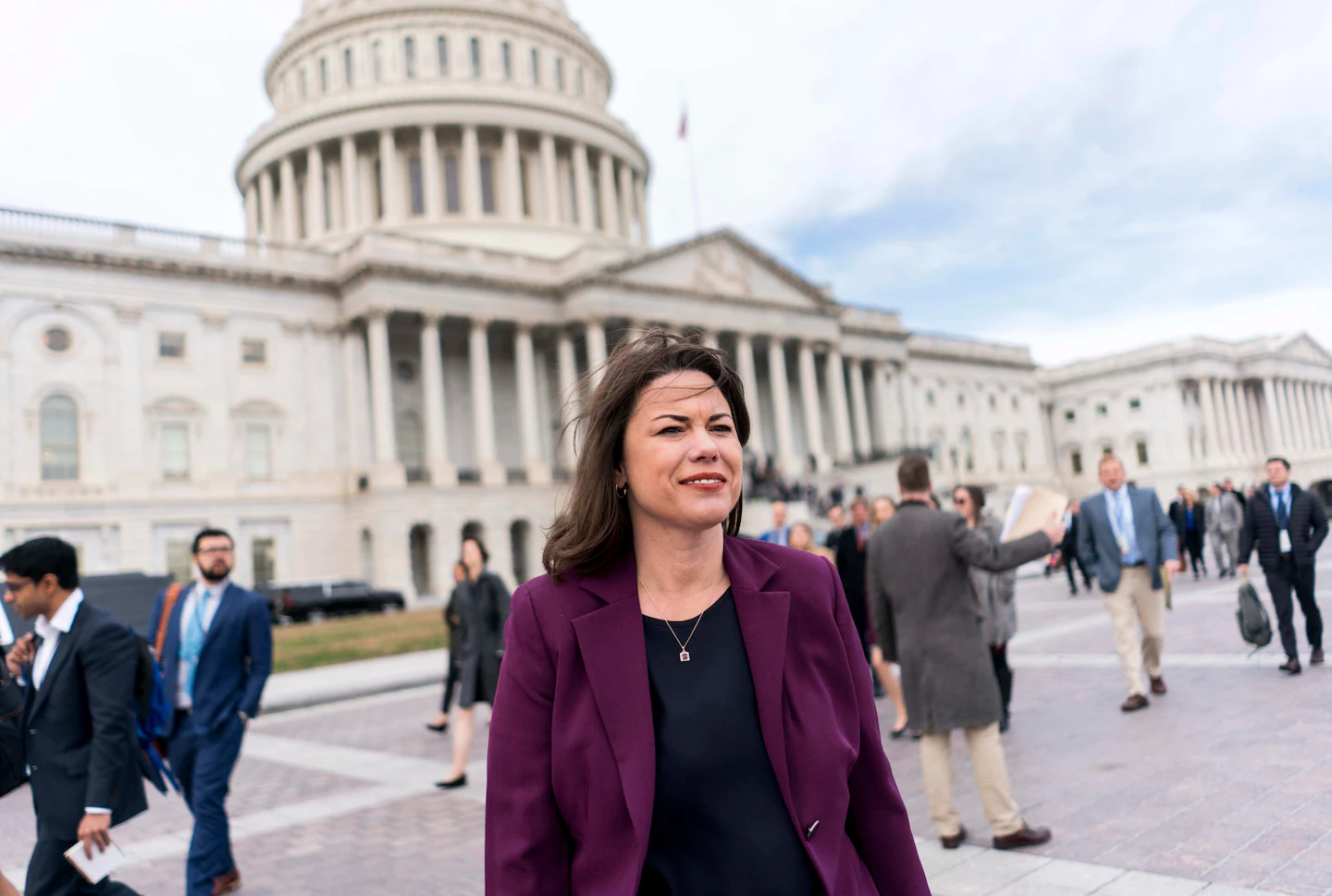[ad_1]
Democrats are trying to sell future health-care reforms to voters right now
Democrats are poised to get their health-care win, with the economic package expected to pass in the House tomorrow.
Their next challenge? Selling the public on a package the party believes will lower health costs for many Americans, even as some of the major changes won’t have a tangible impact on voters’ pocketbooks for months to years to come.
The package has given Democrats running in tight reelection races a fresh way to slam their opponents. They’re preparing attacks on Republicans for voting against legislation aimed at making the costs of prescription drugs more affordable and touting the package as a win against the powerful pharmaceutical industry.
- “I think our voters are going to see that we’ve been willing to stand up on their behalf against some pretty well-funded special interests,” Rep. Angie Craig (D-Minn.), a vulnerable Democrat, told The Health 202. She added: “For me, it’s about positioning myself as the person that is doing what she promised to do when she got elected to Congress.”
In 2020, Democrats campaigned on an ambitious health agenda if voters would give them control of Congress and the White House. But the negotiations over the party’s economic package were fraught with uncertainty, worrying rank-and-file members that they would head home from Washington this summer without having passed lasting revisions to the health system. Now, Democrats are relishing the prospect of campaigning on their health-and-climate bill.
The Democratic Senatorial Campaign Committee:
“The biggest climate bill in American history”
“It’s also a health care bill”
“The bill includes a three-year extension on the Affordable Care Act subsidies”The Inflation Reduction Act will make a real difference — there’s no doubt about it. https://t.co/24VRd3bSmy
— Senate Democrats (@dscc) August 9, 2022
It will take time to fully implement the health provisions included in the bill, which Democrats have dubbed the Inflation Reduction Act.
A handful of major policies kick in next year. This includes the $35 per month cap on the cost of insulin for diabetic Americans enrolled in Medicare. Meanwhile, beefed-up financial aid for roughly 13 million Americans enrolled in Obamacare plans is already in effect and getting extended for another three years. The enhanced tax credits would expire at the end of the year if Democrats don’t pass the spending bill, putting Americans on the hook for paying hundreds of more dollars for their coverage.
But many other measures, particularly the major drug-pricing provisions, don’t begin for another few years. A policy imposing a $2,000 per year limit on how much those enrolled in Medicare’s voluntary prescription drug benefit pay for medications begins in 2025. However, people who pay exorbitant amounts for their medicines will get some financial relief in 2024. And a signature piece of the bill — allowing Medicare to negotiate the price of drugs — won’t begin until 2026.
Some lawmakers say they’re gearing up to message to their constituents that change takes time.
“I think there’s the reality of [the fact] we’re now going to be negotiating with pharmaceutical companies. … We are actually changing how this works for seniors, and how this works for Medicare,” Rep. Abigail Spanberger (D-Va.), another lawmaker in a competitive race, told our colleague Tony Romm. She added it would be hard to do in a short time frame, saying it is part of the “realism” of being an elected official who has to “make choices” about policy. “It’s on us to be able to explain that.”
The Kaiser Family Foundation’s Larry Levitt:
Yet, Democratic strategists believe the expected passage of the legislation will serve as a potent political tool on the campaign trail.
- “There’s a very important promises made, promises kept message here that really plays into the understandable cynicism the public has had over time about progress in this area,” said Chris Jennings, a longtime Democratic health policy consultant who worked in the White House during the Clinton and Obama years.
Republicans are fiercely opposing the legislation — a fact Democrats’ House and Senate campaign arms plan to weaponize. The party is preparing to make the GOP’s vote against the drug-pricing provisions a centerpiece of campaign messaging and paid advertising, said Nora Keefe, a spokesperson for the Democratic Senatorial Campaign Committee.
But the GOP is planning to fight back. They’ve hinged their campaign attacks on hammering Democrats on the price of gas and the highest rate of inflation in four decades.
- “The last thing voters want during an economic recession and record-high inflation is billions more in government spending to fund liberal pet projects, tax hikes and army of IRS agents,” Michael McAdams, spokesperson for the National Republican Congressional Committee, told our pals at The Early 202.
Meanwhile…the Centers for Medicare and Medicaid Services is gearing up to tout the savings Americans are seeing due to the enhanced Obamacare tax credits as the House is poised to greenlight a three-year extension of the policy.
Top agency officials are set to release a blog post, shared with The Health 202, detailing the impact the financial aid has had on consumers. For instance, CMS says that the beefed-up tax credits have reduced premiums by an average of 50 percent or $67 per consumer per month.
Democrats savor spending bill while looking to the future
As Democrats prepare to cast their final vote on President Biden’s economic agenda, vulnerable party lawmakers are gearing up for the next fight: Surviving the midterm elections this November so they can finish what they started, our colleague Tony Romm writes.
Senate Majority Leader Chuck Schumer (D-N.Y.) has made clear Democrats’ work isn’t finished. “If we win, we’re going to have to do a reconciliation bill that will take care of a lot of things we couldn’t do,” he said.
As we’ve already noted, the sweeping health, climate and tax bill — which House Democrats are expected to pass Friday — would usher in the biggest changes to the health system in about a decade. But the package still stops short of Democrats’ more ambitious, original version, after party leaders jettisoned a wide array of proposals in pursuit of cutting a deal with centrist holdouts.
With control of Congress on the line, many party lawmakers have tried to strike a political balance between touting their recent victory while pledging to make a new run next year at the ideas they had to abandon.
Monkeypox vaccine maker voices concerns on U.S. dose-splitting plan
The manufacturer of the only vaccine approved by the Food and Drug Administration to protect against monkeypox said yesterday it doesn’t support the Biden administration’s new strategy to split doses and change how the shots are delivered, our colleague Dan Diamond scoops.
“We do have some reservations … due to the very limited safety data available,” Bavarian Nordic CEO Paul Chaplin wrote to Health and Human Services Secretary Xavier Becerra, and Food and Drug Administration Commissioner Robert M. Califf in a letter sent Tuesday and obtained by The Post.
Biden officials acknowledged to Dan that the manufacturer had concerns, but said it wouldn’t affect the administration’s vaccine strategy. Some officials said they believed Bavarian Nordic’s concerns stem from a potential loss in profits should the United States and other countries be able to stretch their existing vaccine supplies and reduce the need for future orders. A representative for Bavarian Nordic, who spoke on the condition of anonymity because they were not authorized to comment, stressed that the company’s concerns were driven by safety.
Under the new approach, providers would inject one-fifth of the normal vaccine portion under the top layer of the skin to stretch supply. Califf, who authorized the new method, cited a 2015 study into the two-dose vaccine that he said showed the strategy would be effective. Chaplin was one of the authors of the study.
Bottling monkeypox vaccines could take until 2023
The Biden administration is in talks with multiple companies about bottling millions of new doses of the monkeypox vaccine, yet doing so could take three to six months, Politico’s Erin Banco and Adam Cancryn report.
The administration is trying to shore up more vaccines by striking deals with companies to bottle doses currently stored by Bavarian Nordic in Denmark, where there are as many as 12 million doses available. Once the deals are finalized and vaccine bottled, American regulators will likely have to inspect the doses, a process that could stretch into next year, Erin and Adam write.
One official we spoke to said that once demand met supply, it could go back to reg dosing strategy. But an HHS official said the CDC does not expect to reverse course on the dosing strategy.
More here:https://t.co/OUV1EIMcqh
— Erin Banco (@ErinBanco) August 10, 2022
- In Nebraska: A woman is being charged with helping her daughter end a pregnancy after investigators obtained the pair’s private Facebook messages that authorities allege show discussions of using medication to induce an abortion and to then burn the fetus, the Associated Press reports.
- In Wyoming: A judge blocked the state’s near total ban on abortion from taking effect yesterday while a legal challenge against the new law works its way through the courts, according to Reuters.
- Rebekah Jones — the former Florida public health official whose claims of being fired for objecting to manipulate covid data were “unsubstantiated” — will appeal her disqualification from the Democratic primary for the 1st Congressional District. A judge ruled last week that Jones was ineligible for the race, saying she hasn’t been a registered member of the party for a full year as required by state law, per the Pensacola News Journal.
- House Oversight Chairwoman Carolyn B. Maloney (D-N.Y.) pressed the Biden administration to evaluate a potential emergency use authorization for Tpoxx to speed up access to the monkeypox treatment, The Post’s Dan Diamond writes.
Thanks for reading! See y’all tomorrow.
[ad_2]
Source link

